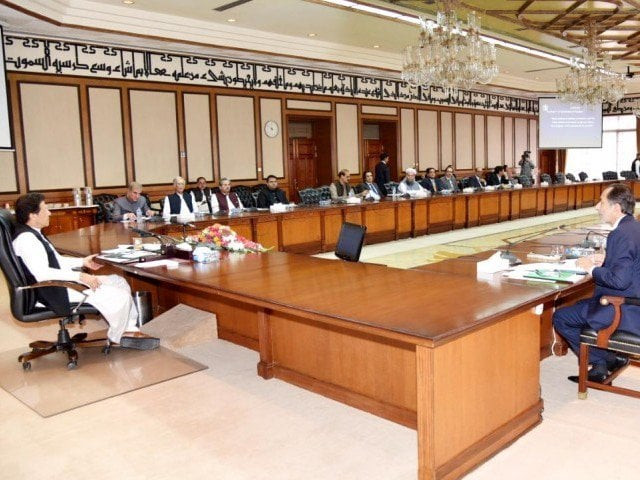Cabinet decides to withdraw FBR’s tax policy powers
FBR opposes immediate transfer of policy function, saying it can have revenue implications

File photo of PM Imran chairing a federal cabinet meeting. PHOTO: RADIO PAKISTAN
The subject of tax policy will be transferred to the Finance Division from the Revenue Division, subject to fulfillment of all legal obligations, according to the cabinet’s decision.
The cabinet has decided to separate tax policy from revenue administration in line with the manifesto of Pakistan Tehreek-e-Insaf, stated a press release issued by the Prime Minister’s Office. To this effect, a committee has been constituted to work out legal and technical modalities.
“Eventually, the policy wing of the FBR will be transferred to the Finance Division,” said State Minister for Revenue Hammad Azhar.
Finance Minister Asad Umar personally made sure that the summary to withdraw tax policy powers from the Revenue Division reached the Cabinet Division. The summary was not part of the cabinet agenda.
The tax policy unit will be responsible for providing the government with policy options and advice in taxation matters. The unit will have at least half a dozen functions, which the FBR is also insisting on keeping with itself. The tax policy unit is different from the policy board that has been established under the FBR Act 2007.
In its summary, the FBR had asked the cabinet that the tax policy unit should be established keeping the legal provisions in perspective, according to a senior government official. The FBR also opposed the immediate transfer of policy function to the Finance Division, insisting that the transition should be in a phased manner. It cautioned that otherwise there could be problems in revenue collection.
The cabinet was informed that under the law, the role of tax policy rested with the FBR. The FBR Act 2007 empowers the FBR to administer all the tax laws and make policies.
The finance minister has been pushing for setting up the tax policy unit in the Finance Division - away from the FBR headquarters. However, the Rules of Business 1973 assign the function of tax policy to the Revenue Division. The Revenue Division is expected to formulate the tax policy in consultation with all the stakeholders. The PTI government has promised to double tax collection and enhance the extremely narrow tax base. However, it is struggling to take right decisions and make appropriate appointments to achieve the objectives.
The cabinet also set up an implementation committee to work out the modalities, role and responsibilities of the Finance Division and Revenue Division for seamless transition and activities. The committee will comprise the finance minister as chairman, minister of state for revenue, cabinet secretary, finance secretary and FBR chairman as members. The committee can also co-opt any other member.
The purpose of separating tax policy from tax administration is to improve governance and tax laws in Pakistan, according to the FBR’s summary. The combination of the tax policy and revenue administration has an inherent problem of using the policy as a tool to maximise revenues at the expense of investment and economic growth.
The tax policy unit will be responsible for revenue forecasting, tax expenditure analysis, distributional analysis, economic impact analysis, cost-benefit analysis and tax indicator analysis, according to the summary approved by the cabinet.
However, the FBR wanted to keep the Tax Policy Research and Analysis Wing within the organisation, which would have almost similar functions that would be performed by the tax policy unit. The research wing will frame revenue proposals, support the Finance Division in estimating the revenue impact of taxes and analyse trends in revenue performance.
The policy wing will also support the Finance Division in tax expenditure estimates, determining the tax gap, come up with the compliance rate and support business intelligence, according to the FBR’s proposal. Any such decision will result in duplication of work, which could create issues in decision-making.
The FBR admitted that the existing Inland Revenue Policy wing was not adequately equipped to undertake research and analyse data for policy formulation. Tax policies in the past have not been formulated by using econometrics and statistical analysis.
Published in The Express Tribune, November 30th, 2018.
Like Business on Facebook, follow @TribuneBiz on Twitter to stay informed and join in the conversation.



















COMMENTS
Comments are moderated and generally will be posted if they are on-topic and not abusive.
For more information, please see our Comments FAQ